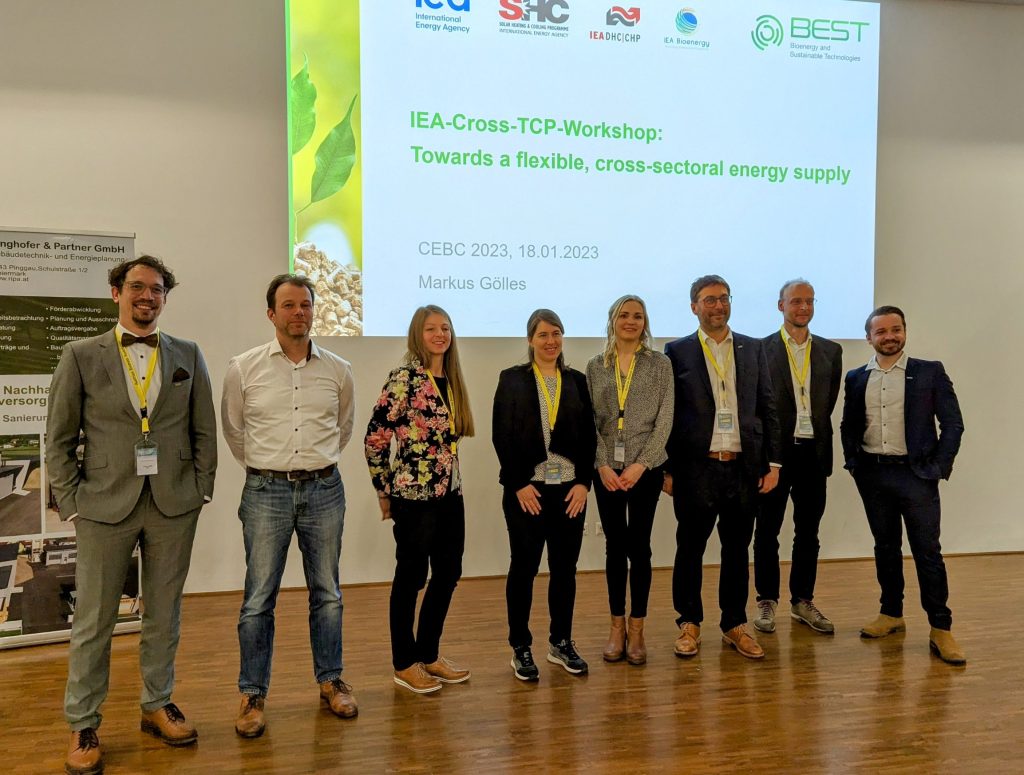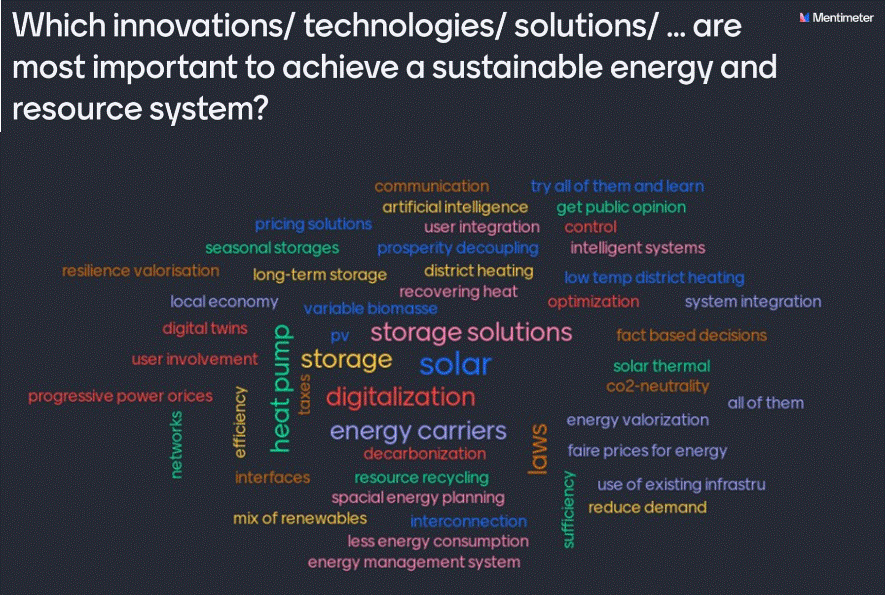IEA-Cross-TCP-Workshop: “Towards a flexible, cross-sectoral energy supply”
With a special focus on the flexibility provision via the heating sector.

Speakers from left to right: Matthias Kuba (BEST, Austria), Ingo Leusbrock (AEE INTEC, Austria), Teresa Schubert (Wien Energie, Austria), Maria Lechner (INNIO Jenbacher, Austria), Elina Mäki (VTT, Finland), Markus Gölles (BEST, Austria), Dietrich Schmidt (Fraunhofer IEE, Germany), Viktor Unterberger (BEST, Austria)
A sustainable energy supply can only be achieved through a flexible, cross-sectoral energy system that utilises the specific advantages of various renewable technologies. Based on specific presentations on the user needs among different sectors, the possible roles of different technologies were discussed. The workshop took place as side event of the Central European Biomass Conference 2023 in Graz as a physical meeting. The event was open to all interested parties and reached more than 50 participants. The workshop was structured in two presentation parts and a final discussion. Organized and chaired by Markus Gölles from BEST – Bioenergy and Sustainable Technologies, Austria, a particular focus was placed on providing flexibility through the heating sector. By bringing together different users representing municipal and industrial energy supply and technology experts from different IEA Technology Collaboration Programmes (TCP), the workshop supported a holistic discussion.
Participating Technology Collaboration programmes (TCPs)
Bioenergy
Task 44: Flexible Bioenergy and System Integration
SHC – Solar Heating and Cooling
Task 68: Efficient Solar District Heating Systems
DHC – District Heating and Cooling
Annex TS4: Digitalisation of District Heating and Cooling
Annex TS5: Integration of Renewable Energy Sources into existing DHC Systems
AGENDA
Chair: Markus Gölles, BEST – Bioenergy and sustainable Technologies, Austria
Block A – Future needs of users and the specific role of biomass
Wien Energie‘s vision of a sustainable energy and ressource supply of Vienna, Teresa Schubert, Wien Energie, Austria
Digitalization of energy management systems – optimization of internal energy use as an industrial company, Maria Lechner, INNIO Jenbacher, Austria
Flexible Bioenergy and System Integration, Elina Mäki, VTT Technical Research Centre of Finland, Finland and Task Leader – IEA Bioenergy Task 44 Flexible Bioenergy and System Integration
Use Case: Syngas platform Vienna for utilization of biogenic residues, Matthias Kuba, BEST – Bioenergy and Sustainable Technologies, Austria
Block B – Flexibility provision via the heating sector
Transformation of District Heating and Cooling Systems towards high share of renewables, Ingo Leusbrock, AEE INTEC, Austria Lead of Austrian delegation – IEA DHC Annex TS5 Integration of Renewable Energy Sources into existing District Heating and Cooling Systems
Opportunities offered by long-term heat storages and large-scale solar thermal systems, Viktor Unterberger, BEST – Bioenergy and Sustainable Technologies, Austria Task Manager – IEA SHC Task 68 Efficient Solar District Heating Systems
Possibilities through digitalization on the example of District Heating and Cooling, Dietrich Schmidt, Fraunhofer Institute for Energy Economics and Energy System Technology IEE, Germany, Operating Agent – IEA DHC Annex TS4 Digitalisation of District Heating and Cooling
Main conclusions
Large cities have a comparatively small share of renewables at the moment. They need very high energy inflows, as it is not possible to generate all the energy required within the cities. For a sustainable energy supply of large cities sustainable energy carriers are necessary.
It is very important to use the heat released by the different sector coupling technologies, e.g. CHP or electrolysers, to achieve high efficiencies and utilization rates. To achieve this, district heating and spatial energy planning must play a major role.
The reduction of energy demand must not be forgotten.
A successful transition of our energy and resource supply requires the appropriate integration of all stakeholders and appropriate policy frameworks.
The solutions will be multi-energy systems involving many different technologies. This implies that a well-trained workforce with expertise in many different areas will be needed. Also, a competition of different renewables should be avoided, as all of them are needed. The focus should be on identifying the optimal use of the different available technologies. Due to the volatility of most renewable energy sources and the highly variable geographical boundary conditions storages and energy carriers will be very important.
Increased digitalisation will be necessary because of the increasing complexity and limitation of the workforce.
———
The final audience survey highlights the complexity in the transition towards a sustainable energy and resource supply and provides an overview of the many different tasks that need to be addressed.



